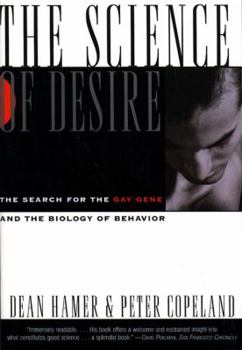The Science of Desire: The Search for the Gay Gene and the Biology of Behavior
Select Format
Select Condition 
Book Overview
In July 1993, a scientific event made front-page news: the discovery that genetics plays a significant role in determining homosexuality. In The Science of Desire, Dean Hamer -- the scientist behind the groundbreaking study -- tells the inside story of how the discovery was made and what it means, not only for our understanding of sexuality, but for human behavior in general. In this accessible and remarkably clear book, Dean Hamer expands on the...
Format:Paperback
Language:English
ISBN:0684804468
ISBN13:9780684804460
Release Date:December 1995
Publisher:Simon & Schuster
Length:272 Pages
Weight:0.75 lbs.
Dimensions:0.7" x 6.1" x 8.9"
Customer Reviews
3 ratings
Getting your money's worth
Published by Thriftbooks.com User , 20 years ago
Dean Hamer, the scientist, and Peter Copeland, the writer have produced an informative entre to the complex world of the genome for the general reader. They've done the job in a very interesting but measured manner. While the book is dated, it is not outdated.
Bloody brilliant book
Published by Thriftbooks.com User , 25 years ago
A really good piece of scientific writing that is not only good, well researched science, but is also well written. Dean Hamer has proved something that I'd already known since I was knee high to a grasshopper, but its good to see proof for those who dont already know this from personal experience.
Excellent lay description of one search for a gay gene
Published by Thriftbooks.com User , 26 years ago
I very much enjoyed reading this book and learned a lot from it both about the way in which these particular researchers are going about their work and about genetics in general. Hamer is the Chief of the Section on Gene Structure and Regulation in the Department of Biochemistry at the National Cancer Institute. This book describes in lay terms the work that led to the publication of the scientific paper entitled "A Linkage Between DNA Markers on the X Chromosome and Male Sexual Orientation". The goal of the study was to determine whether male sexual orientation was "genetically influenced" and what they found was "a statistically significant correlation between the inheritance of genetic markers on chromosomal region Xq28 and sexual orientation in a selected group of homosexual males." The statistical significance was strong: the odds of the correlation happening by chance was only 1 out of 100,000. Before they started looking at genes, Hamer and his group considered the family histories of the pairs of gay brothers who he used in his study. The researchers found more gay men on the maternal side and eventually realized that this was due to recessive X-linked inheritance. "X-linked traits always are passed to men through the mother's side of the family, which is the pattern we were seeing for homosexuality." The book carefully explains how the research was done and what conclusions could and could not be drawn from it. They did not find a gay gene; they only showed that one exists. It does not "determine" homosexuality; it is only one factor in the makeup of those gay men who inherited it. There may be other genes that play a role and there are surely many environmental factors that influence the expression of homosexuality. Some of the evidence from Hamer's study "suggests that Xq28 plays some role in about 5 to 30 percent of gay men." The book closes with a chapter on the social implications of this research. There is also an interesting chapter addressing the question "How could a gay gene survive consistent with the facts of evolution?"




